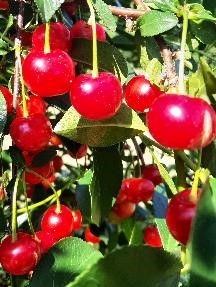Tree Fruit Newsletter — July 7, 2023
Measuring the Nutritional Status of Fruit Trees

Leaf samples can be collected in a few weeks for assessing the nutrient status of your orchards. Mid to late July is ideal for an accurate measure of nitrogen status. Samples collected after this date will underestimate the nitrogen level and can lead to overfertilizing next spring. If you submit samples late, please, take this into consideration when interpreting results. Leaf sampling instructions are outlined below, and the form to submit with each sample is also below as PDF. Annual leaf sampling is preferred to soil samples for orchard trees since they better represent nutritional status, but a soil test is recommended every three years. If you have not measured soil pH is the last three years, your orchard is due for a soil test. Soil samples are important for preplant fertility where new orchards will be added. I will be accepting samples at the upcoming Summer Tour.
If submitting a soil sample, please enclose wet soil in a plastic bag. Soil should not be dried with heat, but can be air-dried at ambient temperatures. Dry samples can be submitted in boxes which are available at each of the county offices. Call ahead because they are in short supply this year. Soil sampling instructions are available on the website.
The lab now offers online payments at their website:
Home – Analytical Lab and Maine Soil Testing Service – University of Maine (umaine.edu)
Summer Tour RSVP is July 12th. To RSVP, call Renae Moran at 207-713-7083 (or email at rmoran@maine.edu). Cost to attend the summer tour will be $30, but the Society will cover the registration for two full members in good standing.
Renae Moran
https://extension.umaine.edu/fruit/
University of Maine Cooperative Extension
PO Box 179
Monmouth, ME 04259
(207) 933-2100
Instructions for Collecting Leaf and Soil Samples
Leaf Samples
1. Samples should contain leaves from only one variety. Different varieties should be sampled separately, if possible. Mid to late July is ideal for collection of leaves.
2. Take a random sample from throughout the orchard. Select trees in good health and typical of the orchard in tree size, age, crop load and vigor. Do not take leaves from sick trees. Avoid yellow leaves on Honeycrisp.
3. Collect 50 to 100 leaves from this year’s shoots. Pick leaves that are midway down the shoot. Avoid leaves from shaded parts of the canopy or that are yellowing from stress.
4. Ideal block size is 10 acres or smaller. However, larger areas can be sampled if tree age, crop load, weed control and soil fertility are the same throughout.
5. Dry leaves by placing in sunlight and place inside paper bags that are labeled with your block name, and variety.
Soil samples
1. The soil should be a composite or mixture of 15 separate samplings scattered over each block. Each block should be uniform in weed control, soil texture, fertility and past soil management.
2. Use a sampling tube, augur or spade. Take the soil from within the tree row and to a depth of 8 inches.
3. Place the composite sample in a container and mix thoroughly. Transfer soil to the Soil Testing Box and fill it fully. Boxes are available from the Highmoor Farm.
4. Label the box with the orchard name, block name and your phone number or address.
Each leaf or soil sample must be accompanied by the Plant and Soil Analytical Lab form (see next page). This information is used for your fertilizer recommendation. If leaves and soil are sampled from the same block, only one form is needed.
Leaf and soil samples can be brought directly to Highmoor Farm or mailed to:
Highmoor Farm
PO Box 179
Monmouth, ME 04259.
They can also be mailed directly to the Soil Testing Lab in Orono:
Analytical Laboratory and Maine Soil Testing Service
5722 Deering Hall
Orono, ME 04469-5722
In complying with the letter and spirit of applicable laws and pursuing its own goals of diversity, the University of Maine System does not discriminate on the grounds of race, color, religion, sex, sexual orientation, transgender status, gender, gender identity or expression, ethnicity, national origin, citizenship status, familial status, ancestry, age, disability physical or mental, genetic information, or veterans or military status in employment, education, and all other programs and activities. The University provides reasonable accommodations to qualified individuals with disabilities upon request. The following person has been designated to handle inquiries regarding non-discrimination policies: Director of Equal Opportunity, 101 Boudreau Hall, University of Maine, Orono, ME 04469-5754, 207.581.1226, TTY 711 (Maine Relay System).
